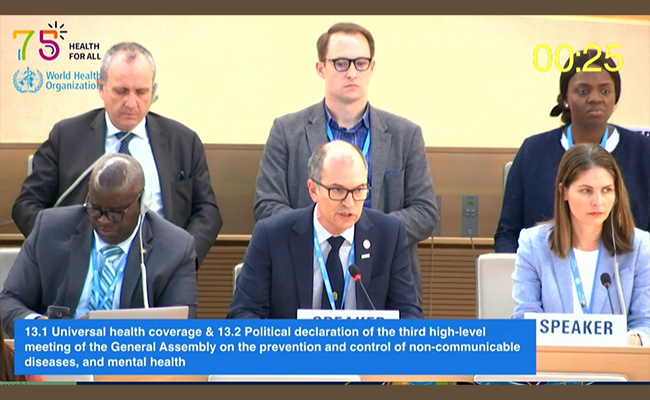
Otago Associate Professor Wayne Morriss (front row, centre) addresses the World Health Assembly in Geneva in May.
When healthcare policy is discussed at a global level, nothing compares to being there.
University of Otago Clinical Associate Professor Wayne Morriss recently returned from a week in Geneva, Switzerland, attending the World Health Assembly (WHA) of the World Health Organisation. The WHA is the main policy-setting meeting of ministries of health from around the globe.
Associate Professor Morriss, of the Department of Surgery and Critical Care in Christchurch, made a statement to the WHA in his role as President of the World Federation of Societies of Anaesthesiologists (WFSA). The federation represents around 500,000 anaesthesiologists in 145 countries and aims to improve access to safe anaesthesia worldwide. He also took part in a range of other meetings with key decision makers.
“WFSA has an official liaison role with WHO and this allows us to speak at meetings like the World Health Assembly. It's important to be at the table and be part of the discussion, and it doesn't get any higher than this forum where over 190 governments from around the world are setting global health priorities.”
Associate Professor Morriss says global health care disparities are laid bare during the WHA.
“The New Zealand view is different from the world view. Even though things aren't perfect here, we have an enviable health system compared to many countries. Things that we take for granted, such as access to safe surgical care and anaesthesia, are often not available in countries with limited resources.”
In 2015, the Lancet Commission on Global Surgery found that five billion out of seven billion people worldwide do not have access to safe, affordable surgical care and anaesthesia when needed.
“This has not always been well understood by governments and the global health community. Hence the importance of advocating for anaesthesia and surgical care as a component of universal health coverage.”
Associate Professor Morriss says WFSA supported two key resolutions being discussed by WHO member states, one on integrating emergency, critical and operative (ECO) care, and the other one on improving access to medical oxygen.
He read a statement to the assembly outlining support for the resolutions on behalf of the global anaesthesiology community. WFSA also called on WHO member states to address chronic underinvestment in anaesthesia and surgical services. He was also invited by the governments of Ethiopia and Malaysia, co-sponsors of the ECO resolution, to make a statement at a separate event.
Both resolutions were passed unanimously by WHO member states.
Associate Professor Morriss has represented WFSA at two previous WHAs.
“It's a fascinating and exhausting week. For WFSA and the global anaesthesiology community, it's vital that we're there – raising awareness and arguing for better resourcing for patients worldwide.”
- Kōrero by Andrea Jones, Team Leader, Divisional Communications